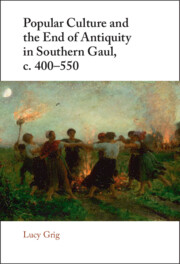Book contents
- Popular Culture and the End of Antiquity in Southern Gaul, c. 400–550
- Popular Culture and the End of Antiquity in Southern Gaul, c. 400–550
- Copyright page
- Contents
- Figures
- Maps
- Acknowledgements
- Abbreviations
- Maps
- Chapter 1 Introduction
- Chapter 2 Urban Contexts for Popular Culture in an Age of Transformation
- Chapter 3 Popular Culture, Society and Economy
- Chapter 4 Christianizing Popular Culture
- Chapter 5 An Alternative View
- Chapter 6 The Kalends of January
- Chapter 7 Conclusions
- References
- Index
Chapter 6 - The Kalends of January
The Persistence of Popular Culture1
Published online by Cambridge University Press: 15 March 2024
- Popular Culture and the End of Antiquity in Southern Gaul, c. 400–550
- Popular Culture and the End of Antiquity in Southern Gaul, c. 400–550
- Copyright page
- Contents
- Figures
- Maps
- Acknowledgements
- Abbreviations
- Maps
- Chapter 1 Introduction
- Chapter 2 Urban Contexts for Popular Culture in an Age of Transformation
- Chapter 3 Popular Culture, Society and Economy
- Chapter 4 Christianizing Popular Culture
- Chapter 5 An Alternative View
- Chapter 6 The Kalends of January
- Chapter 7 Conclusions
- References
- Index
Summary
This final substantive chapter looks in detail at the festival of the Kalends of January as an extended case study for the persistence of popular culture in late antiquity. This distinctively late antique festival is examined from a number of angles, looking at its official and informal, public and private dimensions. Next, the longstanding ecclesiastical critique of the festival as ‘pagan’ is discussed. Key themes of the festival are then considered in turn, starting with the role of festive licence, often seen as a central feature of popular culture more broadly. The Kalends masquerades, including dressing up as animals and in the clothes of the opposite sex, are explored. Next the important element of gift exchange is discussed, providing a way in to look at the social and economic dimensions of the festival. In this way this chapter shows the continuing role of the festival in negotiating the unequal yet broadly stable social relations of late antique Provence, despite the hostility of the church.
- Type
- Chapter
- Information
- Publisher: Cambridge University PressPrint publication year: 2024

